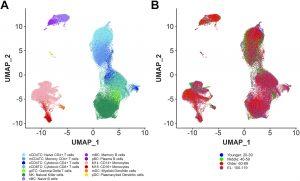The health of our approximately 30 trillion cells—of which the immune system is one of the most important—depends on how well they cooperate with one another and support one another. The correct operation of our immune system begins to diminish as we get older, which is one of its distinguishing features. A small group of people known as centenarians exhibit delays in aging-related illnesses and mortality, suggesting that their immune systems continue to operate well into old life.
According to a recent study, centenarians have immune systems that are highly functioning, have effectively adapted to a history of illness, and have unique immune cell types with diverse compositions and activities (Figure 1). This has allowed them to live very long lives. These immune cells could discover crucial treatments for ailments and lengthen life.
In order to identify distinctive characteristics of this cohort that help the discovery of genetic and lifestyle variables leading to their longevity, they were able to compile and evaluate the biggest single-cell dataset of centenarian people.
The researchers used single cell sequencing on peripheral blood mononuclear cells (PBMCs), a large category of immune cells circulating in the blood, obtained from seven centenarians, in order to discover immune-specific patterns of ageing and extreme human lifespan. In order to explore compositional and transcriptional changes in circulating immune profiles throughout the human lifetime and extreme old age, the researchers combined this dataset with two other publically accessible single-cell RNA sequencing (scRNA-seq) datasets of PBMCs.
These results, in the opinion of the researchers, lay a solid platform for further study into immune resilience systems that may be responsible for extreme lifespan and serve as a target for healthy ageing treatments.
Journal article: Karagiannis, T.T., et al., 2023. Multi-modal profiling of peripheral blood cells across the human lifespan reveals distinct immune cell signatures of aging and longevity. eBioMedicine.
Summary by Stefan Botha











